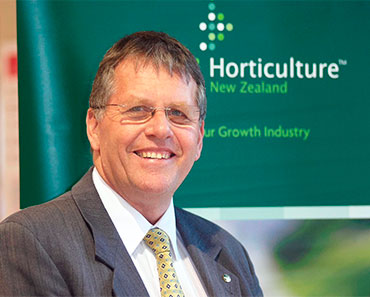Future leaders may be “moulded” by their birth order and the first 10 years of life within their families, believes HortNZ president Julian Raine. He’s conducted his own unofficial research and found the majority of people in leadership roles are first-born. “Often the eldest child is relied on more by their siblings and consequently learn leadership skills from an early age,” says Julian, who, a first child himself, told those attending a Future Leaders Group meeting in Tauranga in October. Julian is a Nuffield Scholar and chairman of the NZ Nuffield Farming Scholarship Trust and says up to 90 per cent of the world’s Nuffield scholars are the oldest in their families. Julian and HortNZ vice president Tony Howey, who spoke to the Future Leaders Group at the end of a visit by the HortNZ board to the Bay of Plenty on October 19, say while birth order may influence leadership tendencies, leaders are not “born” but need to develop these skills. Both stressed the importance of developing young leaders in the horticultural industry, saying those who wished to be leaders shouldn’t wait for someone to “shoulder tap” them. Instead they should be self-starters and look for mentors to assist them to develop the skills required. Tony, who is a middle, not a first, child, says his older sister was among his mentors as he was growing up. “She was and still is incredibly organised and a great role model. “However, I never took up leadership roles at school or university.” Tony says he became a leader when he realised he couldn’t achieve his goals without working with other people. Lonely role Both speakers warned that leaders can at times be lonely and open to criticism. That’s where self-belief, and belief that the goals they want to achieve are the right ones, become vital. “Also, have fun. Leaders who are not having fun are not in the right place. You must enjoy what you are doing,” says Julian. Tony and Julian also credit their respective wives and their 30-plus year marriages with playing vital roles in their personal successes. In response to questions from the meeting, they also acknowledged that taking on demanding leadership roles can be more difficult for women who also wish to have a family. Work-life balance They and fellow HortNZ directors Leon Stallard and Barry O’Neil admitted to working exceptionally long hours, often seven days a week, and struggling to find a “work-life” balance. On the other hand, director Mike Smith, who now does work exceptionally long hours, says some years ago he left his job to care for his young family while his partner developed a business. Each speaker suggested there is no one definition of leadership, and those who aspire to be leaders should set their own goals and ways of achieving them. Julian says the next generation of young leaders has different attitudes to work-life balance than his generation and that’s not necessarily a bad thing. All the speakers urged young people to take up leadership training opportunities through industry and other organisations and to develop their personal skills because the rewards to be gained from leadership are significant and life-changing. The Future Leaders Group is made up of people from within, or associated with, the horticultural industry who take part in opportunities to learn, share, gain new experiences and network through organised social events and educational workshops. To join Future Leaders email: info@nzkgi.org.nz or find more information at: For the HortNZ Leadership Programme. See:www.hortnz.co.nz/our-work/people/ For the Kellogg Rural Leadership Programme, see: www.kellogg.org.nz For the Nuffield Scholarship, see: http://nuffield.org.nz



0 Comments
Leave a Comment